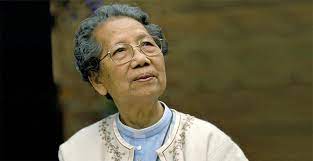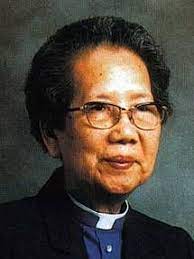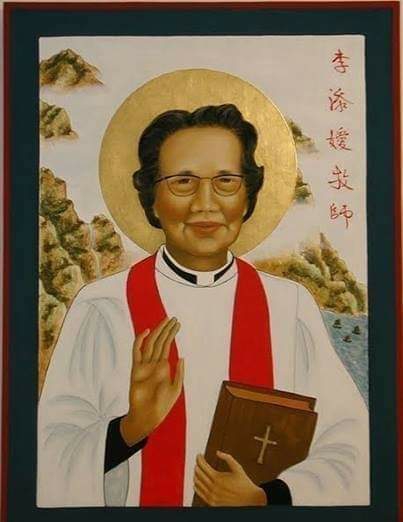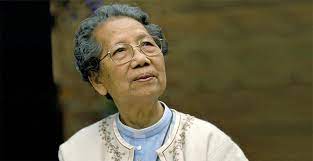 St Alban’s Episcopal Church Bolivar, Missouri January 25, 2022 The Rev. Dr. Florence Li Tim-Oi May 5, 1907- Feb 26, 1992 Ordained priest on January 25, 1944  “I have given her permission to celebrate the Lord’s Supper. If I could reach her, I should ordain her rather than give her permission. I’m not an advocate of the ordination of women. I am, however, determined that no prejudice should prevent the congregations committed to my care having the sacraments”. This is how Bishop Ronald Hall wrote to Archbishop William Temple explaining his decision to ordain Chinese Deaconess Florence Li Tim-Oi to the priesthood in 1944 – long before any province had ever ordained a woman in the Anglican communion. But what was the emergency? She had already been ordained Deaconess in 1941 and was serving refugees from mainland China in Hong Kong and then in neutral Macau. But the Japanese occupation of Hong Kong made it impossible for Anglican priests to get there. She could travel, being “only a woman.” And so, at first, Bishop Hall gave her permission to celebrate the Eucharist – for the best possibly reason: so that his congregations would not do without it. By January, 1944, he determined to ordain her to the priesthood. They both traveled separately and secretly and met in an area of China where the Japanese had not yet occupied. He ordained her in the presence of Chinese clergy on January 25, 1944, after which she returned to Macau. In 1946 word reached her that the Archbishop of Canterbury had denounced Bishop Hall for ordaining her, and she felt the pressure to either resign her position to save the Bishop – or force his resignation by continuing. Do not imagine that this was easy for her. But she agreed to stop serving as priest of her congregation, but not to deny her priesthood. Bishop Hall continued his ministry. And so did she – although not quite so openly. “I voluntarily and wholeheartedly supported Bishop Hall in upholding his office as bishop. He was a man of deep spirituality Not only was he influential in the Chinese Church, but his international contributions were also large. I was willing to give up my title of priest, but I knew that having been ordained, I had to follow the order throughout my life. I had to be obedient without minding small matters and, without remorse, serve the church with my best effort. This is my philosophy of life. No one can take away the peace that comes from completing one’s responsibilities to history and fulfilling God’s will. Jesus’ teaching is very precious: “No one who puts his hand to the plow and looks back is fit for service in the kingdom of God. ” And, “Any of you who does not give up everything he has cannot be my disciple.” Thence, I gladly pressed on in serving God and continued with my duties.” (Remember that she was already “legitimately” ordained as a deaconess, and was able to work in that capacity.) In January, 1947, she left Macau, and was sent to Hepu to take up her post as rector of St Barnabas, a congregation that had been started in 1918. She was introduced as “deaconess,” but in 1949, Suffragan Bishop Halward corrected the parishioners by emphasizing that she should be recognized as priest. She restarted the church, opened a school, began a maternity home where she taught women and men to cherish their baby girls as much as their boys – started a Chinese and an English Youth Society, taught English, preached and celebrated Eucharist. But in 1952 when China was liberated” – the church and all other of those institutions were closed. In 1953, after a year doing advanced studies at the Union Theological College in Beijing, she was sent back to her own school, Union Theological College at Guangzhou where she taught Christian students how to understand and evangelize by adopting the “three-self” movement that the government required: “Self-rule, self-support and self-propagation.” (This actually was wise – and the tragedy is that Christian churches had not encouraged and insisted on this themselves long before.) By 1958 the seminary students and teachers were forced to move to communes to do manual labor – and as the political climate continued to deteriorate, the seminary was closed in 1960. By 1966 the Red Guards began to brutalize intellectuals and others, including her and other clergy, and by 1968 the “cleansing movement” had swept the province – sending her and others to political “re-education.” She survived that, praying, thinking, learning all she could about how to be a Christian and a priest under intense pressure to renounce both. Religious freedom was reestablished in 1979 – and churches began to hold service openly again. But in Guandong province, only one church was still suitable for worship. This is what she wrote: “Even though it was dingy, dilapidated, and in need of repair, and in need of re-consecration of the altar, we celebrated our Christmas there. That Christmas celebration is one I have never forgotten. In a country in dire need of material goods, we couldn’t celebrate in the traditional way. We had no Christmas tree, or decorative sets of shepherds and wise men at the stable. There was no Santa Claus to give presents to our children. Even the liturgy of the Holy Eucharist had to be abbreviated, not to mention the joy of fellowship of a Christmas dinner for parishioners. However, we could and did hold a solemn Christmas thanksgiving service. More than twenty young people joined together to form a choir. Hearing the message of the birth of our Savior in beautiful song deeply moved the congregation of over a thousand. Their praises and thanksgiving echoed in unison. The reverberation of the carols could be heard in east Guanzhou. I was deeply touched. This Christmas celebration was a reminder of the complexity of human relations and how important the birth of Christ was to humanity. Consider, for example, the Cultural Revolution, in which material things were destroyed, human dignity was trampled, lives were sacrificed, and condemnation was suffered by the innocent – who can pass judgment on who was responsible and who was at fault? We are fortunate to have the birth of Christ Jesus who gave up himself to save mankind. This great sacrifice of life by the righteous for the iniquitous shows that “God demonstrated his own love for us in this: While we were still sinners, Christ died for us” (Romans 5:8.) The Lord asserted the principle of forgiveness everywhere. This is the way. If we base our actions on secular principles, then vengeance upon vengeance will never end. Christ was born as the Prince of Peace. Christ came, as Word made flesh. The highest purpose was to realize, “earth as in heaven;” for all wars to cease, to maintain world peace, obliterate man-made woes, promote human peaceful co-existence and harmony, to create a holy world together with God.” (Her comments here and above are from the memoir she wrote, “Raindrops of my life.” It is only available in Canada, but was given to me. If anyone wants to read it, I will happily share.) Bu 1981, She immigrated to Canada to be with her sister and other relatives who had already made their way to the west. By this time, of course, women were being regularly ordained priest in the US – since January, 1977. The Rev. Virginia Brown, whom many of you knew and loved, was ordained in that first month. In 1984, St John’s Chinese Congregation held a Thanksgiving Eucharist in Toronto in honor of her 40th anniversary of ordination. It was a grand celebration. *But do notice this: She celebrated the Eucharist with the Rev. Ken Fung and curate Allison Kemper assisting. Suffragan Bishop Parke-Taylor gave the benediction. Priests from the Japanese and Korean Anglican Churches and two Canadian women priests also took part in the service. Do you see? Enemies reconciled. Peace restored in Christ. One Lord. One Faith. One baptism. One Body. *And notice this, too: Today Bishop Hall is celebrated as well, in England and elsewhere for his wisdom in seeing what the Church failed to see in 1944 and for acting on it, for which vision and action he was once denounced…for which he never apologized, either. Not everything is exactly as it seems at the time. Not everything that seems right turns out to be. Not every “radical” action actually is. Not every suffering leads to despair and hopelessness. Not any darkness is final. And it is always too soon to give up. I have loved Florence Li Tim-Oi from the first time I learned of her. And history is my great strength and stay, providing the perspective and emotional distance to hold on when things seem to be impossible.  |

Categories:
Tags:
No responses yet